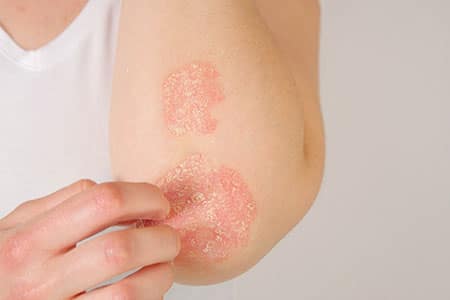Psoriasis is a group of chronic skin disorders that causes itching, burning, scaling, or crusting of the skin. At Cascade Eye & Skin Centers, we treat all forms of psoriasis, as over seven million men and women in the United States are affected by some form of this condition. The most common forms include:
- Plaque
- Nail
- Guttate
- Inverse
- Pustular
- Erythrodermic
Symptoms of Psoriasis
Although there are a variety of forms of psoriasis with varying levels of severity and symptoms, some general signs to be aware of include:
- Patches of red skin, often with silvery scales
- Itching, crusting, or flaking of red patches
- Dry, cracked skin
- Thickened, pitted, or ridged nails
- Burning or soreness sensation
Psoriasis typically develops between the ages of 15-25, and the most commonly affected areas are the scalp, elbows, knees, hands, feet, and genitals.
Causes of Psoriasis
The exact cause of psoriasis is unknown, but it is believed to derive from an issue with the immune system. Although the problem with the immune system is not entirely clear, genetics and environmental factors seem to play a role in the development of this condition. Some environmental factors that may contribute to the onset of this condition in predisposed individuals are:
- Smoking and exposure to secondhand smoke
- Excessive alcohol consumption
- Illnesses
- Cold weather
Types of Treatment
Psoriasis cannot be cured, but it can be treated successfully for months or years at a time. Treatment depends on:
- Type of psoriasis
- Severity of condition
- Location of the condition
- Patient’s age and lifestyle
- Patient’s medical history
The main purpose of treatment is to reduce inflammation, diminish scaly patches, and manage other painful symptoms. The most common treatments utilized are:
Topical Medications
Often the first line of treatment is topical treatments like creams and ointments, which are able to slow cell reproduction and soothe inflammation.
Phototherapy
This type of treatment reduces inflammation by slowing skin cell reproduction through consistent and medically-supervised ultraviolet light exposure. There are two types of phototherapy:
- UVB: ultraviolet light B
- PUVA: psoralen + ultraviolet light A
Prescription Medications
Prescription medications are usually only prescribed for more severe symptoms after topical treatments and phototherapy have been unsuccessful. This type of treatment may entail oral pills or injectables.


